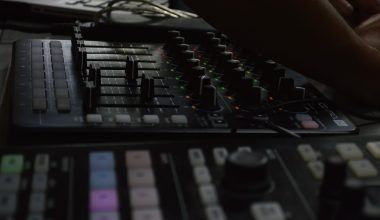Promoting your music on social media can be easy. You can promote your concerts through Facebook Events, create ads on Instagram, or share your music on Twitter, but none of these methods share the story behind your music! Podcasts, on the other hand, are the best place to do that. This comprehensive Musician Guide for Podcasting will help you navigate the world of podcasts to effectively promote your music and engage with your audience on a deeper level.
Why Podcasting for Indie Artists?
Podcasting offers a unique platform for indie artists to connect with their audience in a more personal and engaging way. Unlike social media posts, podcasts allow artists to share their journey, the stories behind their songs, and their creative processes in an in-depth format. This Musician Guide for Podcasting will cover all the steps you need to take to get started, from pitching to podcast hosts to promoting your recorded episodes.
Getting Started: Making a Pitch
The journey to getting on a podcast starts with you making a pitch to get booked on a podcast. Here’s how you can get started:
Research Podcasts
Before pitching your music and story to a podcaster, you should figure out which podcast you would like to promote your music on. One easy way to figure that out is to start with the ones you are listening to. Then, start researching everything you need to know about the podcast, their contact details, mission, and make sure that their vision and values align with yours. This Musician Guide for Podcasting emphasizes the importance of finding the right fit to ensure a successful collaboration.
Know Your Audience
Note: Know the podcast and their audience before making your pitch, or else you will end up promoting your music to a bunch of listeners who are not really interested in your music.
Crafting Your Pitch
How to write the pitch? You have to be clear, precise, and compelling when you write your pitch. Speak to the podcaster directly and tell them why you are interested in their podcast and why they should host you. Highlight what makes your story unique and how it aligns with the podcast’s theme and audience.
Preparing for the Interview
Once you have secured a spot on a podcast, it’s time to prepare for the interview. Here’s a detailed Musician Guide for Podcasting on how to get ready:
Understand Your Host’s Style
Listen to some podcasts to better understand your host’s style and how the conversation goes. This will help you tailor your responses and make the interaction smoother.
Anticipate Questions
If you are feeling a bit nervous, you can ask your host what kind of questions they will be asking. This will help you prepare your answers and reduce anxiety.
Make Notes
Make some notes about the points you would like to deliver to the audience. This ensures you cover all important aspects of your story and music.
You can share your best hits, press shots (if you have any), and bio with the host. This provides them with material to introduce you effectively and create engaging questions.
Recording the Podcast
Here are some tips to ensure a successful recording session:
Technical Setup
Ensure you have a good microphone and a quiet environment to record your podcast. Poor audio quality can distract listeners and diminish the impact of your message.
Engage with the Host
Treat the podcast like a conversation. Engage with the host, ask questions, and be enthusiastic. This makes the podcast more enjoyable for listeners.
Stay On Topic
While it’s good to be spontaneous, try to stay on topic to ensure the conversation is coherent and engaging.
Using the Podcast After Recording
After recording your podcast episode, the next step is promotion. This Musician Guide for Podcasting provides tips on how to make the most out of your podcast appearance:
Promote it everywhere! You have some great content to share with your fans and audience. Share the podcast on Facebook, Instagram Stories, IGTV, and Twitter. Use snippets from the podcast as teasers to generate interest.
Engage with Your Audience
Encourage your fans to listen to the podcast and share their thoughts. Engage with their comments and feedback to build a stronger connection.
Update Your Website
Add the podcast link to your website and any relevant press kits. This provides easy access for new fans and industry professionals.
Dealing with Rejections
And our final advice: Don’t get bummed or bothered if you get a “no” or do not receive a response at all. Your host might be overbooked and wasn’t able to get back to you at the moment, or you might not be the right fit for this particular podcast, or the host was looking for something else, perhaps in a different genre. Whatever the reason might be, just jump on to the next pitch and work on finding your next potential host.
Persistence is Key
Rejection is part of the process. Stay persistent and keep refining your pitch. Every “no” brings you closer to a “yes.”
Latest Trends and Stats in Podcasting for 2024
Podcasting continues to grow in popularity, making it an even more valuable tool for musicians. According to a recent report, there are over 2 million podcasts and more than 48 million episodes as of 2024. Here are some trends to watch:
Increased Listener Base
The podcast listener base is expanding globally. More people are tuning in to podcasts during their commutes, workouts, and daily routines.
Niche Podcasts
Niche podcasts focusing on specific genres or themes are gaining traction. This trend provides opportunities for indie artists to find podcasts that align closely with their music style.
Video Podcasts
Video podcasts are becoming more popular. Artists can leverage this trend by sharing video snippets of their podcast interviews on platforms like YouTube and Instagram.
Conclusion
Podcasting offers a unique and personal way to connect with your audience and share your music story. By following this Musician Guide for Podcasting, you can effectively pitch to podcasts, prepare for interviews, and promote your episodes to maximize your reach. Stay updated with the latest trends and continue to explore new podcasting opportunities to grow your fanbase and enhance your music career.
By following this Musician Guide for Podcasting, you’ll be well-equipped to leverage the power of podcasts to connect with your audience and share your music journey. Remember to incorporate the focus keyword, Musician Guide for Podcasting, throughout your content to optimize for SEO and increase visibility.
For additional resources on music marketing and distribution, visit Deliver My Tune.
For further reading, explore these related articles:
- The Ultimate Guide to Music Distribution For Labels in India
- Music Skills to Develop While Stuck at Home
- How To Create A Successful Live Music Business
For additional resources on music marketing and distribution, visit Deliver My Tune.






